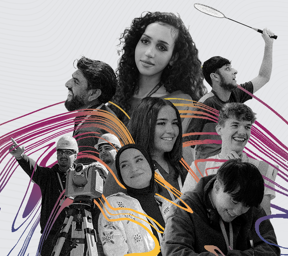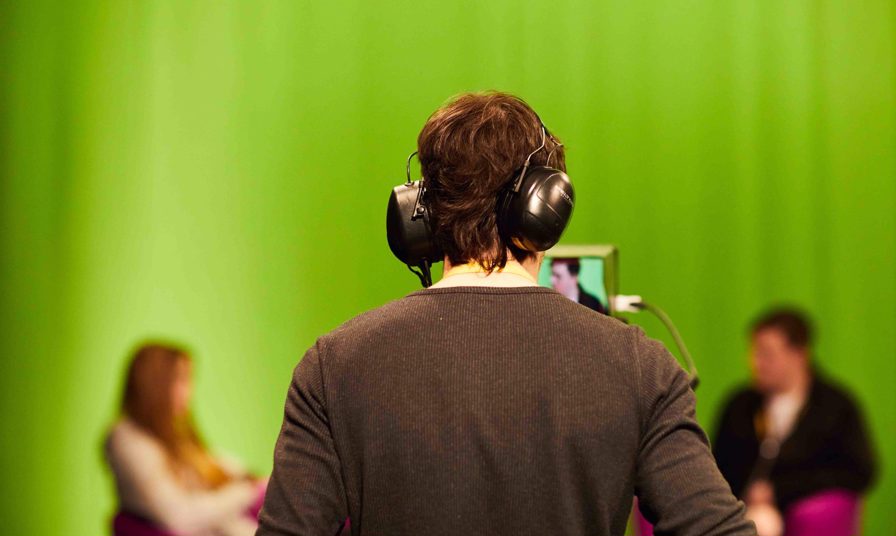Entry Requirements
-
4 GCSEs at Grade C/4 including Maths or English Language or completion of a Level 2 course including GCSE Maths and English Grade C/4.
Study Mode
Full time
Duration
2 academic years
Timetable
Check with tutor
Key features and Benefits
- You will be introduced to industry standard software including the Adobe Creative Cloud as you learn to create video and audio productions.
- Work as a Production Company and produce video content as you take on the challenge of responding to a client brief set by real businesses, professionals and employers.
- Work in our TV studio, edit suites, recording studios and Mac Suites before watching your finished productions on the big screen with surround sound in our specialist screening room.
- Take on work experience with businesses and organisations such as Blackburn Rovers
- Produce films and see them on the big screen at REEL Cinema. Work with Netflix approved cinema cameras,
The UAL Level 3 Film and Television Production opens the door to studying at university, specialist film schools and finding employment in the media sector.
-
Overview
The UAL Level 3 Film and Television Production opens the door to studying at university, specialist film schools and finding employment in the media sector. Former students now produce content for the biggest musicians, brands and broadcasters in the UK as well as forging successful local careers with corporate video production companies.
The purpose of the course is to produce students that are confident technically and creatively while developing professional skills that will serve them well later in their careers. You will have chance to make short films, produce documentaries and create TV programmes in the multi-camera TV studio.
If you have a passion for moving image and would like to work in film, TV, broadcast journalism or would like to develop the skills to produce social media videos then this is the course for you.
-
What will I study?
The course consists of different units that focus on pre and post-production techniques designed to prepare you for the creative media professional. Specialist units will provide you with basic and creative skills in Digital Media as well as information about a range of Media Practitioners and industry job roles. You will learn the following skills:
- Camera techniques
- Video editing techniques
- Sound recording
- Sound editing techniques
- Planning and research
- Scriptwriting
- Interactive media
-
Entry Requirements
4 GCSEs at Grade C/4 including Maths or English Language or completion of a Level 2 course including GCSE Maths and English Grade C/4.
-
How will I be assessed?
-
You will be assessed on the quality of your course work and completed productions. There are no exams on this course.
Your overall grade will come from the final major project, which will be assessed by your tutors and moderated by the exam board at the end of each year.
You can earn a Pass, Merit or a Distinction grade. Our Distinctions are the equivalent of three A* grades at A-Level.
-
-
What can I do next?
-
Students can progress to Media related degree courses or directly to employment within the creative industries.
-
-
Your Study Programme
-
Discover other courses in Media
-
Explore Your Career Options
TV Or Film Director
Directors have overall responsibility for the way films and television programmes are made. As a director, you would use your creativity, organisational skills and technical knowledge to manage the whole production process.
If you are imaginative, and can lead others to work towards your creative vision, this job could be for you.
To do this job, you'll need good planning and communication skills. You'll also need to be decisive and able to work to a budget.
There are many ways into this job. You could start as a runner, or progress from camera or acting work. Employers will be more interested in your experience than formal qualifications.
TV Or Film Assistant Director
Assistant directors, known as ADs, support the director by organising and planning everything on set, leaving them free to concentrate on the creative angle.
You will need to be well organised, a good motivator and able to think on your feet.
Practical experience on set is essential to become an AD. You can gain this by starting out as a ‘runner’, for example, or by doing a film course that includes work placements.
TV Or Film Camera Operator
Camera operators record images for film, television, commercials and music videos. They set up equipment, plan shots and sort out technical and lighting issues.
If you have good practical skills, can visualise shots and have a keen interest in the moving image and photography, this could be a great job for you.
You would usually get into this type of work by becoming an assistant and learning your craft on the job. College courses can also be a good way to get some of the technical skills you'll need.
TV Or Film Production Assistant
As a production assistant, you would support the producer and be responsible for the administration and organisation involved in producing a film or TV programme. If you like working with people and organising things, and you want to work in film or TV, this job could be ideal for you.
You’ll need to be organised and have excellent attention to detail. Being able to take the initiative and think creatively will help you to solve problems throughout the production process.
You could get into this job with a degree. Alternatively, experience is highly valued by employers, and you could move into this career without a degree if you have a background in jobs like advertising, TV or office management.
TV Or Film Sound Technician
As a sound technician in film or TV you would be responsible for recording the voices and background noise on a TV or film shoot in a studio or on location. If you are interested in how sound technology works and would like a hands on practical role, this could be the career for you.
To make sure that the sound team are working as effectively as possible you will need great communication skills in this job. You’ll also need to pay close attention to detail and be able to concentrate so that the right voices and sounds are picked up on your recordings.
There is no set entry route to become a sound technician. Experience of sound recording and an understanding of audio technology and software is very highly valued by employers.
TV Or Film Production Manager
Production managers take care of the business, financial and recruitment side of film and television productions.
The work includes planning schedules, organising resources, locations and equipment, and monitoring costs and budgets.
If you’re well organised, have a good head for figures and would like a varied role in film and TV, this could be an ideal job for you.
You would need a lot of experience to do this job. This could be gained from working as an assistant producer, TV floor manager or assistant director.
TV Or Film Producer
TV and film producers look after the business side of a production, leaving the director and crew to concentrate on the creative work.
The job includes pitching new ideas for projects, securing funding and rights for books and screenplays, and managing budgets.
To do this job, you will need to be well organised, good with figures and an excellent negotiator.
To become a producer, you will need experience of working in the industry and a good network of contacts.

Proud to be ranked number 2* nationally for A-Levels and Technical courses.
*In the Government's latest achievement tables for learners aged 16-18.














